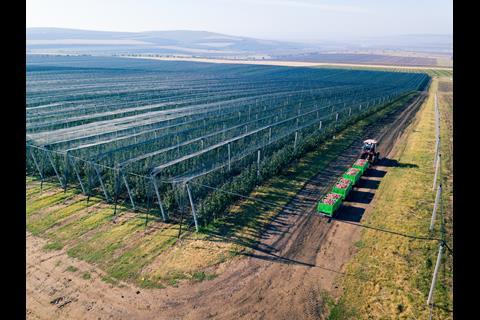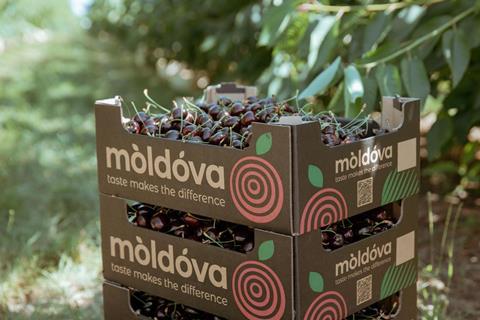Alexandra Bîcu, a marketing specialist at the producer and exporter association Moldova Fruct, explains why we’re set to see plenty more of the country’s fruit in the UK and EU in years to come
What are Moldova’s main fruit and vegetable exports to the UK?
We are relatively new to the UK market, but with small but sure steps we want to reach British consumers through the uniqueness and special taste of our fruits. The main exports of Moldovan fruit to the UK include apples, grapes, cherries and plums. Last year, we exported 460 tonnes of apples, compared to 2022 when no exports were recorded, and 550 tonnes of plums, versus 40 tonnes in 2022, a 14-fold increase.
Cherry exports have also begun to increase. The 2024 campaign was very difficult due to rain at the beginning of the season. Only 70 tonnes were exported. But the 2023 season, the first time we exported cherries to the UK, we send 170 tonnes. In grapes, meanwhile, exports have increased from 150 tonnes in 2022 to 300 in 20233 to 500 in 2024.
What has driven this export growth?
Analysing the structure of exports over the last five years, we can see a drastic change in some directions. Export volumes have been constantly increasing in the past few years with notable growth driven by improved quality standards, better packaging and external national promotion activities. The signing of trade agreements, such as the Deep and Comprehensive Free Trade Area (DCFTA) with the EU has played a key role in facilitating market access and boosting export volumes to the EU market.
A few years ago, Russia was the traditional market for at least half of our fruit and was easily accessible for most producers and exporters. The beginning of the war in Ukraine and the embargoes imposed by the Russian Federation under political pretexts led to a significant increase in logistics costs, which forced producers and exporters to focus on other markets.
At the same time, in recent years, investments have been made in the modernisation of orchards and production processes, which has led to obtaining a quality and competitive product, which has led to an increase in demand for our products on new markets.
What plans have growers and exporters been making following the UK government’s agreement to allow certain Moldovan agri-food products into its market tariff-free for five more years?
Following the announcement, fruit growers and exporters are focusing on expanding their market share in the UK by enhancing product quality, alignment with consumer requirements, increasing production volumes and improving supply chain efficiency.
They are also investing in marketing and branding efforts to raise awareness of Moldovan fruits in the UK market. Investments are continued in production technologies and modern post-harvest equipment. Varieties that are no longer suitable are replaced with new varieties resistant to transportation and climate changes. New sorting lines are being installed for cherries, plums, apples to detect internal defects, not just external ones, to sort and calibrate according to all required parameters (weight, calibre, colour).
Changes are also being made to adapt packaging solutions to market requirements, especially B2C packaging (punnets, 1 kg bags, trays, attractive 2kg and 5 kg cardboard boxes). Producers and importers are familiarising themselves with market requirements and adjusting their production processes accordingly.
What are the biggest opportunities for the Moldovan fruit industry over the next five to 10 years?
Over the next five to 10 years, the biggest opportunity is expanding its presence in high-value markets such as the EU, as well as some countries in the Middle East and Asia. The sector is focusing on modernising its infrastructure, improving product traceability and adopting more modern production practices. Additionally, there is potential for developing stronger branding and marketing strategies to position Moldovan fruit as a premium product in global markets.
For many years we have been considered the “Orchard of the Soviet Union” due to the uniqueness of our fruits. The conditions of our country fully allow us to become a new “Orchard of Europe”.
Look out for an extended version of the interview in the FPJ Marketing & Branding Special, which comes out in early March.






